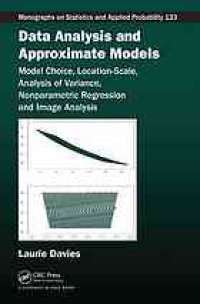"This book presents a philosophical study of statistics via the concept of data approximation. Developed by the well-regarded author, this approach discusses how analysis must take into account that models are, at best, an approximation of real data. It is, therefore, closely related to robust statistics and nonparametric statistics and can be used to study nearly any statistical technique. The book also includes an
interesting discussion of the frequentist versus Bayesian debate in statistics. "--"This book stems from a dissatisfaction with what is called formal statistical inference. The dissatisfaction started with my first contact with statistics in a course of lectures given by John Kingman in Cambridge in 1963. In spite of Kingman's excellent pedagogical capabilities it was the only course in the Mathematical Tripos I did not understand. Kingman later told me that the course was based on notes by Dennis Lindley, but the approach given was not a Bayesian one. From Cambridge I went to LSE where I did an M.Sc. course in statistics. Again, in spite of excellent teachers including David Brillinger, Jim Durbin and Alan Stuart I did not really understand what was going on. This did not prevent me from doing whatever I was doing with success and I was awarded a distinction in the final examinations. Later I found out that I was not the only person who had problems with statistics. Some years ago I asked a respected German colleague D.W. Müller of the University of Heidelberg why he had chosen statistics. He replied that it was the only subject he had not understood as a student. Frank Hampel has even written an article entitled 'Is statistics too difficult?'. I continued at LSE and wrote my Ph. D. thesis on random entire functions under the supervision of Cyril Offord. It involved no statistics whatsoever. From London I moved to Constance in Germany, from there to Sheffield, then back to Germany to the town of Münster. All the time I continued writing papers in probability theory including some on the continuity properties of Gaussian processes. At that time Jack Cuzick now of Queen Mary, University of London, and Cancer Research UK also worked on this somewhat esoteric subject."--
�Read more... 